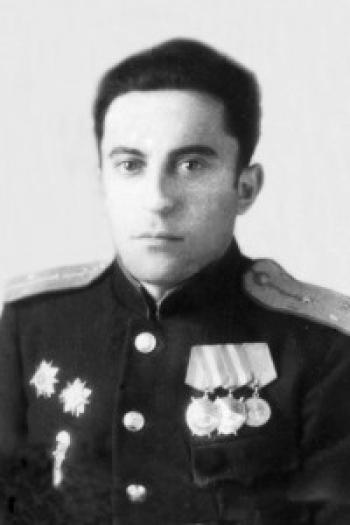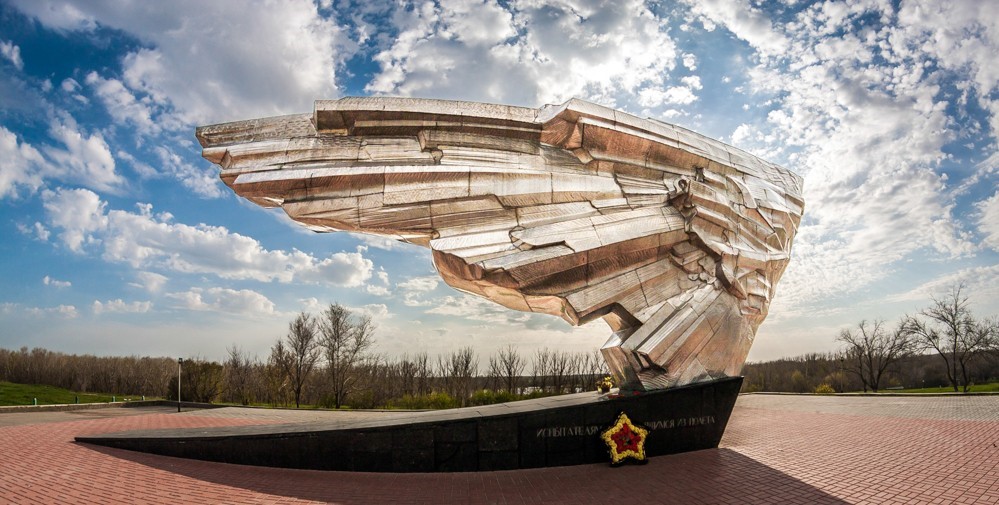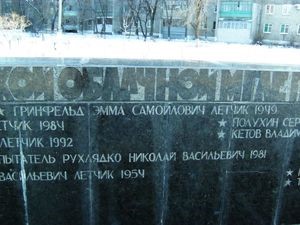Emma (Emanuel) Grinfeld was born in 1916 in a village in the Podolsk Province (in present-day Ukraine). The family was large and poor: For many years, the mother kept giving birth to twins; as a result, there were seventeen children in the family. When Emma was fourteen, one of his older brothers took him to Kiev, in an attempt to help the family and find a job for Emma. Times were hard, and it was rather difficult to find a job for a teenager without professional education. For almost two years, Emma had to work odd jobs, and only in 1932 did his brother manage to get him hired first as an apprentice, and then as an assistant stoker in a locomotive crew. It was at this time that Emma saw an airplane for the first time, and the dream of being a pilot probably took root in his soul. In any case, as he would later tell his wife, he began to scour the newspapers for aviation-related articles, and made clippings out of them. Since he lacked the money to buy newspapers regularly, he would usually collect them in the carriages or at the train station after returning from trips. He used to joke that he learned the aviation news of the Soviet Union and the world with a delay of 10-15 days.
At the age of eighteen, Grinfeld joined an aeroclub, where he studied simultaneously in the airplane and parachute sections. In 1936, Grinfeld received a pilot's license, and was sent to the all-union three-month courses for parachutist instructors in Monino (a famous air base near Moscow). After completing the courses, Emma began to work as an instructor at various aeroclubs. In late 1938, the Kremenchug Aeroclub recruited its second class of cadets, including many young women. One of them was the nineteen-year-old Anna Shepotievskaya. A year later, she became Emma’s wife.
In late 1939, Grinfeld enrolled in an eight-month fighter pilot training course at the Aviation School in Chuguev (near Kharkov). After completing it, he received the rank of second lieutenant, and was sent to a fighter aviation regiment deployed in the village of Ropsha near Leningrad. His wife followed him to his new place of service. During this period, they lived in a private apartment, in very cramped conditions. However, being young and full of hope for a better life, they were able to cope, regarding the daily inconveniences as temporary, minor setbacks.
In early 1941, the Ministry of Defense ordered pilots to be transferred to martial law. Therefore, all officers' wives and their family members had to return to their former places of residence. Soon, Anna left for Kremenchug, being already pregnant. Their son was born after the outbreak of the Soviet-German War, and died during the evacuation, at the age of one month.
Grinfeld’s regiment fought from the first days of the war, defending Leningrad. He performed various duties: repelling bombing raids, providing air cover to the “Road of Life” over Lake Ladoga, flying numerous reconnaissance missions, photographing enemy territory, escorting attack aircraft and bombers.
In 1943, his airplane was shot down during a dogfight. He was able to parachute out in time, but was seriously wounded. Until 1944, he convalesced at a hospital. During the liberation of the Baltic region, Greenfeld's plane was shot down once again. He parachuted out of the burning aircraft and landed in the forest in enemy-held territory, not far from the front lines. His broke his collarbone and forearm during the landing. That same day, Grinfeld crossed over into Soviet territory, where he was mistaken for a spy. Luckily, he was able to resolve this misunderstanding, and returned to his unit. Grinfeld also took part in the battles for the capture of Königsberg and the liquidation of the "Courland Pocket" of German troops. During the war, he shot down two aircraft personally, and another two as part of a group. He was awarded two Orders of the Red Banner and the Order of the Patriotic War (both 1st and 2nd degree).
In 1946, after the end of the war, Grinfeld enrolled in a test aviation regiment, where he learned to fly jet aircraft. In 1947, his regiment was relocated to Akhtiubinsk (Kazakhstan), where the military training classes began. In the regiment, Greenfeld held the position of deputy squadron commander. Soon, he was promoted to the rank of captain. In 1949, while performing an aerobatic program in Akhtiubinsk, Captain Grinfeld was killed in an accident. His death was officially mourned by the military unit, since he had been one of the best pilots in the regiment. Grinfeld was buried at the old cemetery in Akhtiubinsk. His name is inscribed on the memorial to the military pilots of the “Icarus Wing.”









